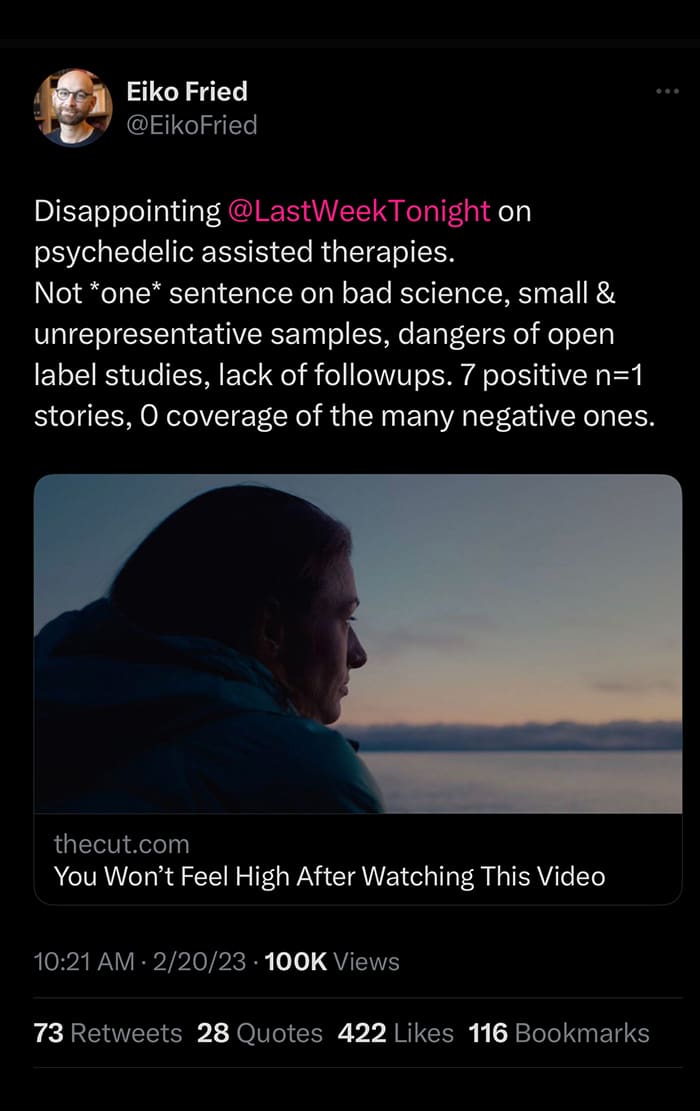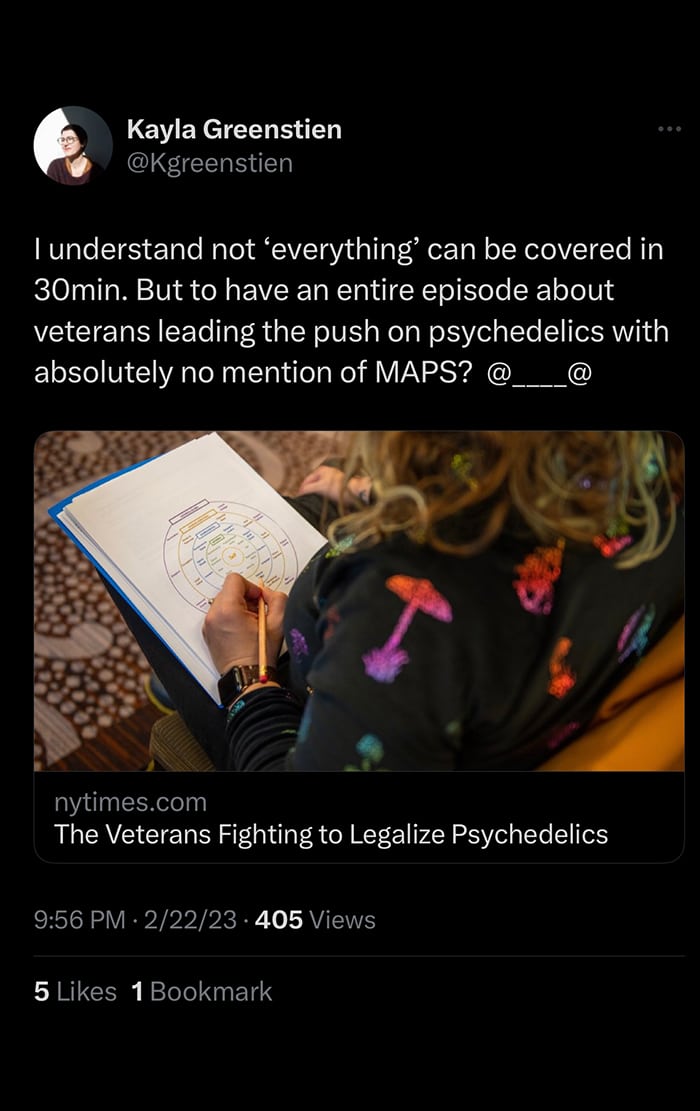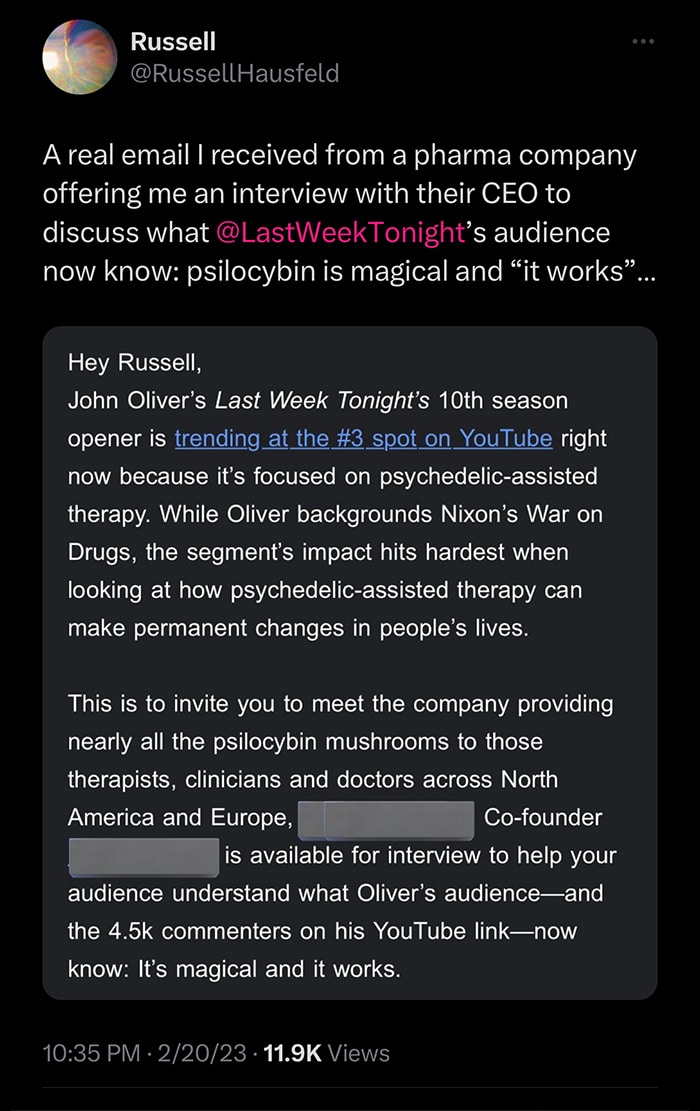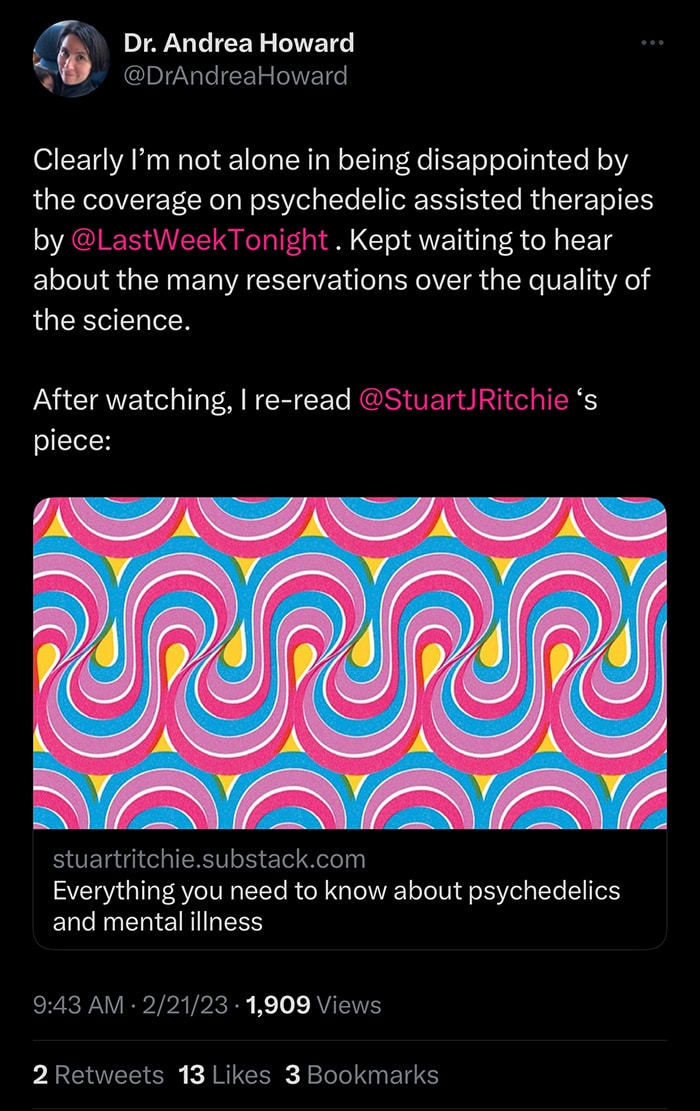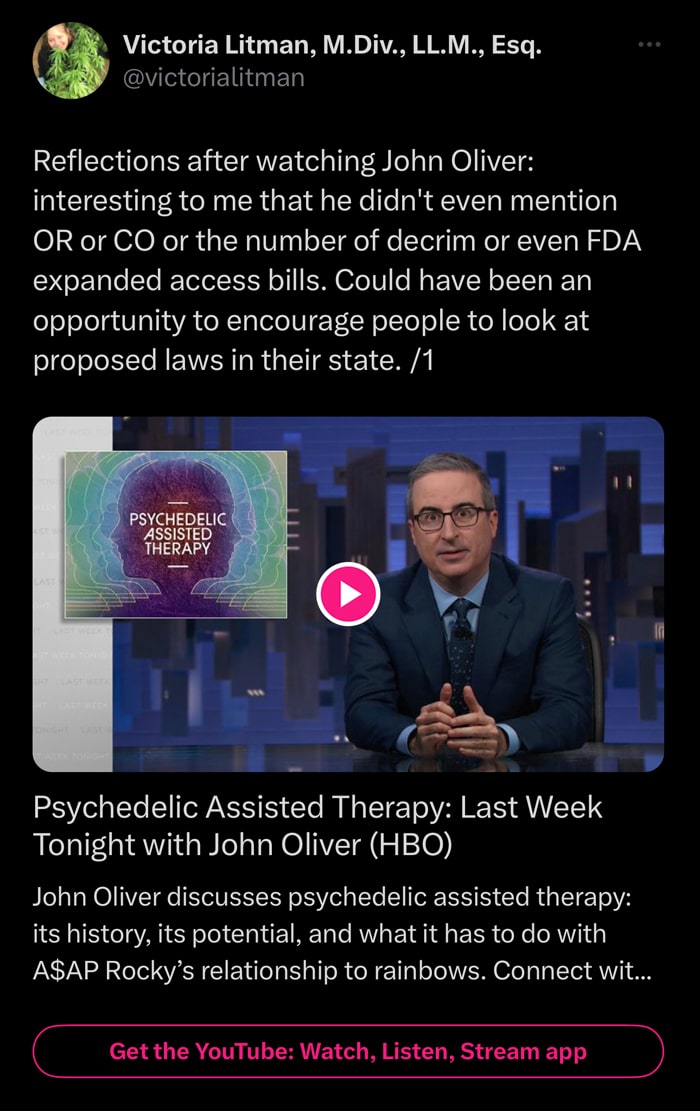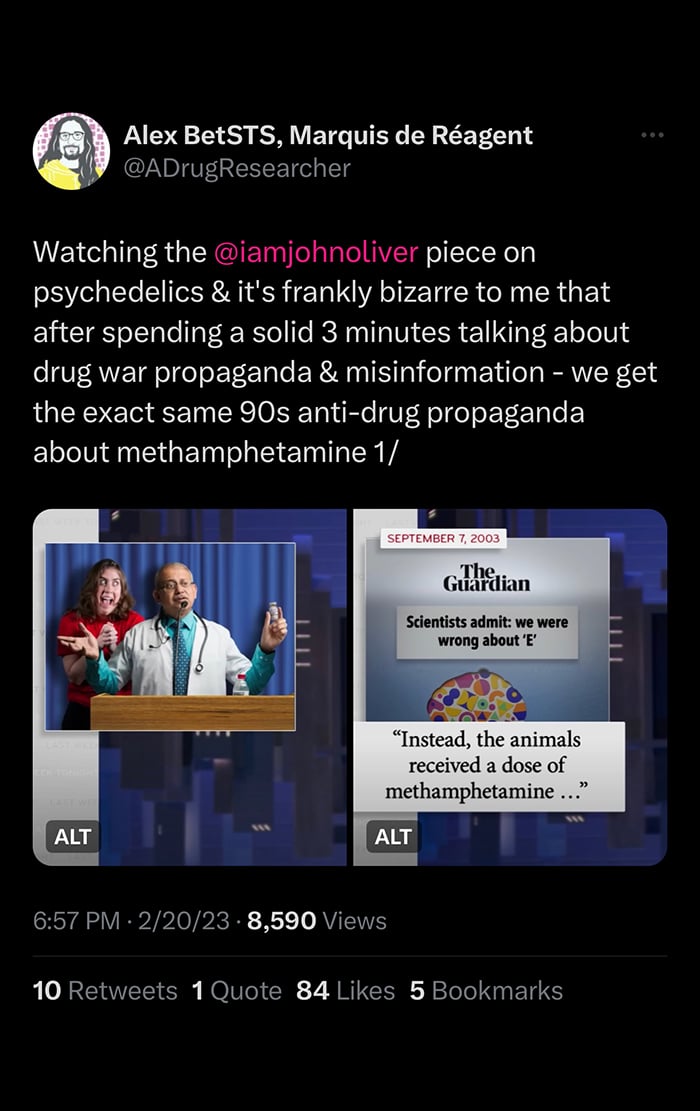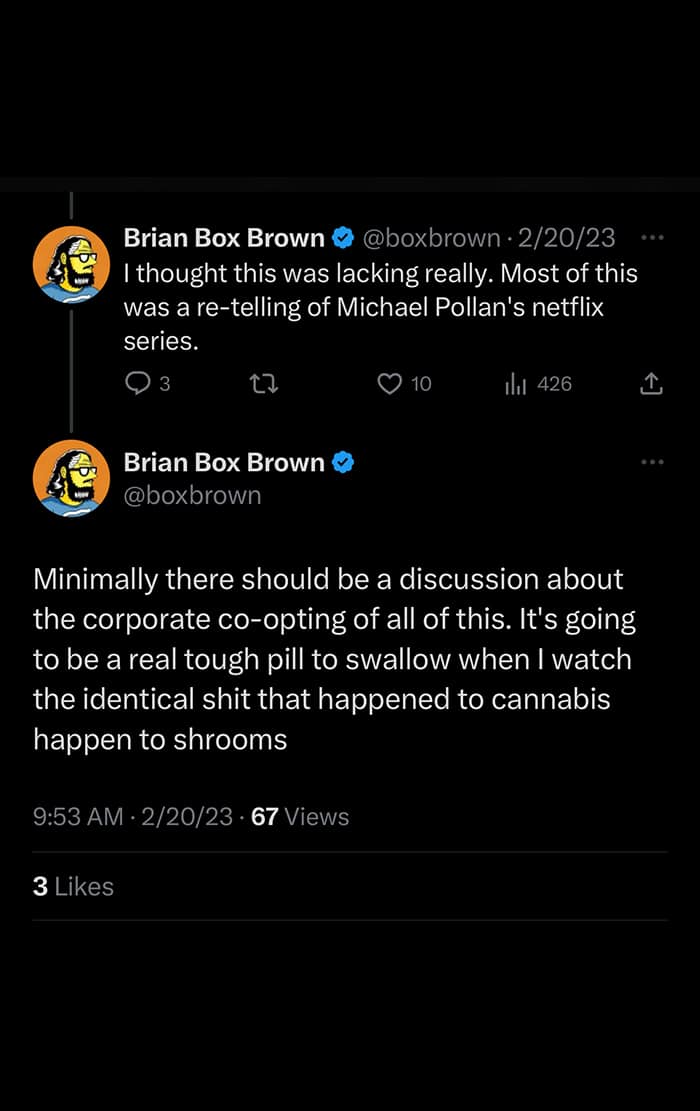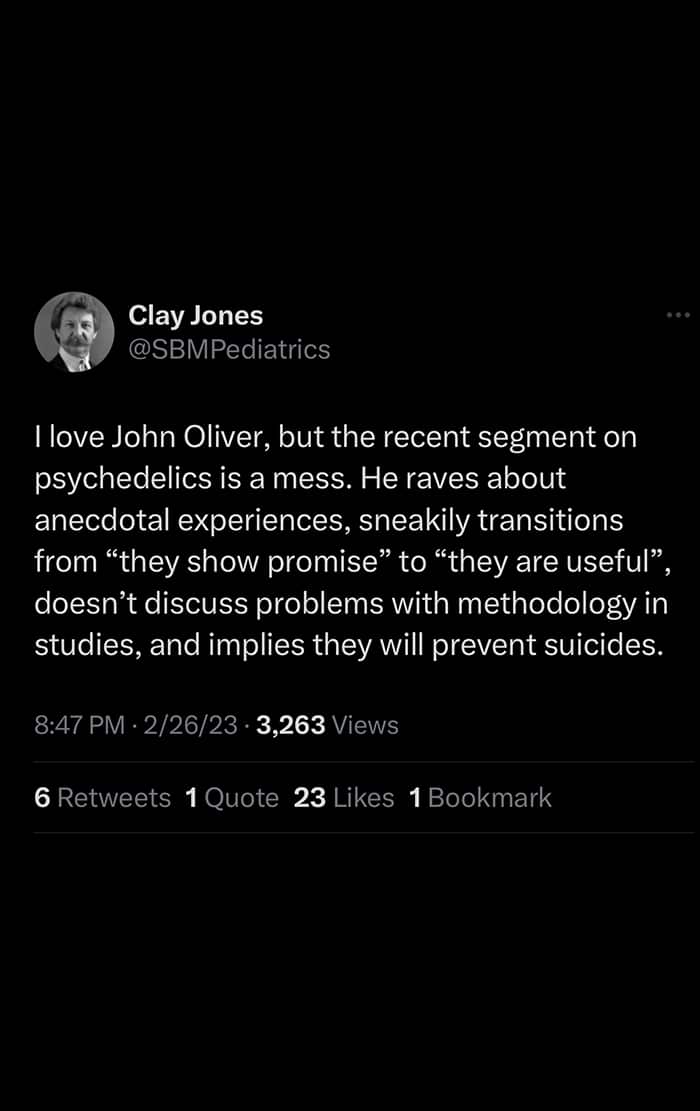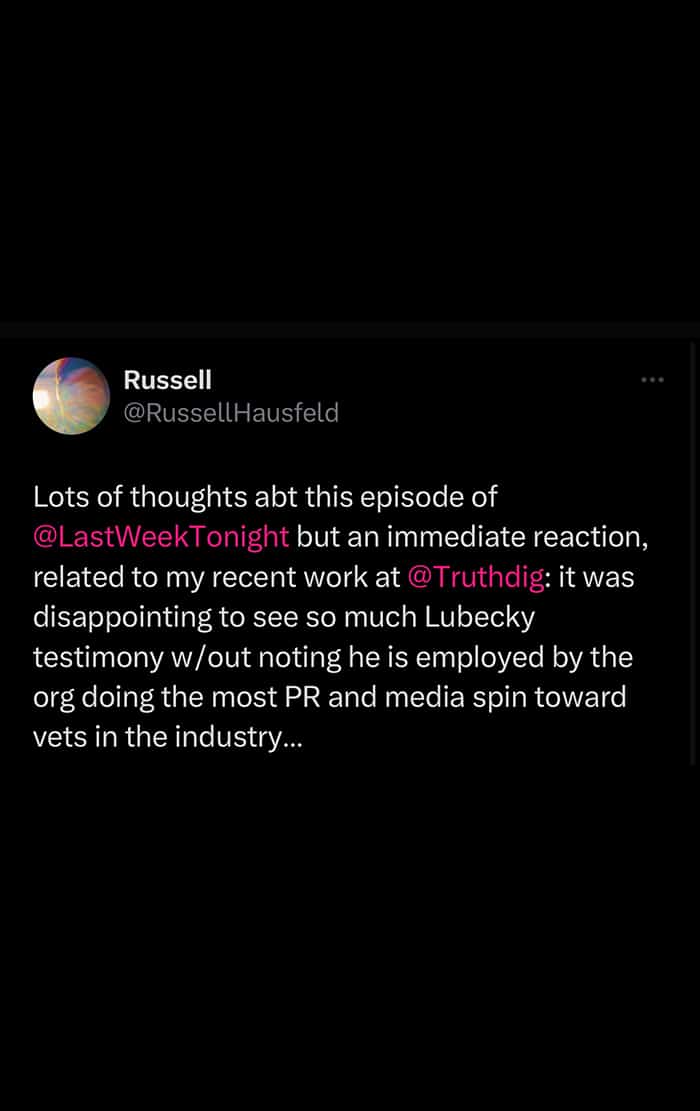An open letter in response to John Oliver’s Last Week Tonight episode on Psychedelic Assisted Therapy
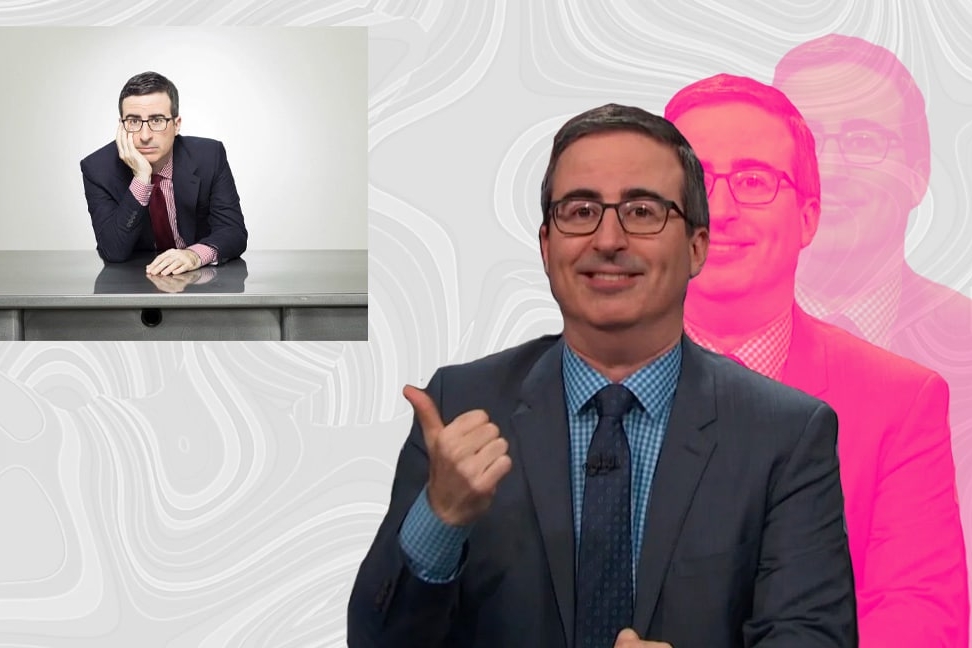
Psymposia is a 501(c)(3) nonprofit research and media organization that offers critical perspectives on drugs, politics, and culture. We rely on contributions from our readers and listeners. Your support is vital to sustaining Psymposia.
Support Psymposia’s independent journalism on Patreon and help us drive the Mystery Machine! We’re a bunch of meddling kids who are unmasking the latest shenanigans on the psychedelics beat.
Last Week Tonight’s February 2023 coverage of psychedelic-assisted therapy promoted psychedelic industry talking points that overhype the science and minimize potential risks. The production team made this decision with full knowledge of the inaccuracy of that hype and the dangers it poses to the public. We know they knew about these issues, because we told them.
In October 2022, Psymposia was informed by a producer from Last Week Tonight that the show was working on a segment about psychedelic-assisted therapy that was originally scheduled for the end of that month. The producer expressed interest in learning more from Psymposia “about safeguards that can be put in place when the treatment becomes more widely available.” This inquiry suggested that the production team was open to challenging the dominant media narratives, which tend to overstate the potential benefits and ignore the serious risks associated with psychedelic medicine. This felt like an opportunity to correct some of the harmful hype on a credible platform. We are publishing this open letter to highlight why we raised concerns about the rollout of psychedelic medicine to Last Week Tonight:
1. Last Week Tonight has a history of highlighting the self-serving tactics of unaccountable corporations, the failures of regulatory agencies to act in the public interest, and the complicity of the mainstream media in advancing narratives that serve the powerful. The psychedelics industry is rife with the sorts of problems that John Oliver and Last Week Tonight have routinely spotlighted.
2. The psychedelics industry has global ambitions, which heightens the need for accurate information. Psychedelic evangelists are positioning psychedelic medicine as “the future of mental healthcare,” claiming that psychedelic-assisted therapy is destined to replace current treatment options. Entrepreneurs and “thought leaders” cite “the mental health crisis” to justify scaling psychedelic medicine as rapidly as possible, but the science does not justify these ambitions.
3. Psychedelic science is limited by small sample sizes and methodological issues that cast doubt on flashy efficacy numbers. Many of the most prominent clinical trials failed to control for variability (dosage, therapeutic protocols, etc.) across sites and sessions, which means that their studies are not able to distinguish between effects caused by the drug and effects caused by other variables. Questionable research practices that have compromised research in other fields are happening in psychedelic research, including switching outcome measures and p-hacking to produce the appearance of significant results. There is also a severe lack of long term (or even medium term) follow-up data, along with a lack of attention to overall quality of life. In some studies, participants who were labeled as “cured” actually deteriorated as a result of being in the trial.
4. Many of the dominant assumptions about psychedelic-assisted therapy (PAT) are unscientific. Psychedelic therapists and “coaches” often promote untested, magico-religious beliefs. There is no consensus on what constitutes the clinical practice of psychedelic therapy. Instead, fringe and “woo” methods and ideologies pervade the field. Such ideas have already been used to cover up harms and to widely promote unsafe models for use.
5. The history of psychedelic therapy is riddled with accounts of harm, including sexual, financial, physical, and emotional abuse. The prevalence of sexual abuse demonstrates that abusive and coercive practices are widespread and normalized. These harms have occurred in both the underground and in clinical trials, even though clinical trials are subjected to the highest level of oversight that psychedelic therapy will ever have. In one case, therapists abused a clinical trial participant on film, and the sponsor organization covered it up. In other cases, clinical trial therapists disregarded participants who complained of worsening suicidal ideation, psychosis-like side effects, and other adverse experiences. At least some of these participants have been counted among the psychedelic therapy “success stories” and statistics credulously presented in popular media.
6. The unique risks presented by the psychedelics industry will only be exacerbated as the field grows. Psychedelic-assisted therapy research will not produce valid results (let alone viable therapeutic treatments) unless the field addresses and corrects the numerous issues that have been documented. When members of the press gloss over these issues to promote pseudoscientific ideas and misleading claims, it increases the risks to the public by normalizing dysfunctional approaches and harmful practices.
7. Last Week Tonight’s track record of bringing attention to underreported stories led Psymposia to believe their segment would correct the overhyped narratives and resulting public misperceptions about psychedelic medicine. Unfortunately, Last Week Tonight did not live up to the principles it has become known for over the past decade.
In our initial call in October 2022, several members of Psymposia met with a producer for over an hour, providing historical background as well as a rundown of patterns of abuse, methodological research issues, and common public relations spin that are rampant within the psychedelics industry. Following that meeting, the producer followed up to thank Psymposia and to request further documents for background research.
Over the three weeks following this call, we emailed summaries of the major problems with research on the efficacy, safety, and viability of psychedelic therapy, and we directed them to more comprehensive resources on each of these issues. We also offered to put the producer in touch with clinical trial participants who experienced harm, and we provided a list of world-renowned experts who were well-suited to provide the types of critical commentary that Last Week Tonight consistently broadcasts.
At the end of October, the producer told us that the plan was to hold off on airing the segment until early in the next season (beginning February 2023) and requested that we circle back in January. We followed up twice after that email, but received no reply until the producer contacted us on February 15 — the Wednesday before the segment was set to air — asking if he could meet with us the following day, February 16.
That second meeting with the producer lasted for over 90 minutes, during which time we discussed ethical issues in the Multidisciplinary Association for Psychedelic Studies (MAPS) clinical trials. We ensured that the producer was aware of footage of the two MAPS clinical trial therapists assaulting Meaghan Buisson, a phase 2 clinical trial participant. Afterwards, Psymposia’s Managing Editor — David Nickles — followed up via email:
“You highlighted questions of access and affordability. You also have footage of Meaghan’s clinical trial experiences…. Perhaps it’s worth asking [what]…will be made available/accessible/affordable, and where those understandings come from? Why is it that the imagined possibility of what this stuff could look like (or possibly achieve) trumps what’s actually happened in the most heavily monitored clinical settings in existence? Imo [in my opinion], this tension seems to be at the core of much of what we discussed today and it just struck me in a way I wanted to articulate to you:
Imagine sitting with Meaghan’s trial footage and saying, ‘We need to make this accessible and affordable to everyone.’ Because, when folks jump to questions of access and affordability, that’s an implicit component of what they’re talking about making accessible/affordable.”
Despite more than three hours of discussion with this producer, Last Week Tonight ran a glowing segment about the “promise” of psychedelic therapy, neglecting nearly all of the critical issues we discussed during production.
One of the sole critical clips offered by Last Week Tonight showed Johns Hopkins researcher Roland Griffiths discussing the potential for bad trips, followed by Oliver stating: “It is important to note that even those in studies who’ve reported hell realm type experiences have often still felt that they benefited from the treatment.” This idea reflects a common industry talking point that “bad trips can be the best trips” — a sentiment that has proliferated among psychedelic cults and abusive practitioners. It has been used directly as a tool to abuse people, and to undermine their ability to identify when something harmful occurs.
Last Week Tonight ran with this narrative despite having full knowledge of what was done to Buisson (and many others) who were subjected to abuse under the banner of psychedelic therapy. The team at Last Week Tonight chose to omit this information and, in doing so, contributed to an atmosphere of silence which allows these harms to proliferate and obstructs efforts at prevention. The ideology that facilitated this abuse is still widespread in the psychedelics industry.
Rather than naming this problem, Last Week Tonight avoided any mention of MAPS. This omission is striking given that MAPS is closest to FDA approval, and a MAPS-employed spokesperson — U.S. Army SGT(R) Jonathan Lubecky — was featured twice in the segment to promote psychedelic therapy. In our view, the decision to avoid naming MAPS while featuring one of its lobbyists can only be explained as an editorial strategy to avoid discussing the existence of Buisson’s videos.
Considering Last Week Tonight’s generally solid track record of tackling issues like corporate greed; mental healthcare; the marketing and overprescription of opioids; regulatory capture; and a slew of other predatory medical industry practices (1, 2, 3, 4, 5), it is disappointing that the show abandoned much of its own prior analyses in favor of a segment that aligns with corporate psychedelic industry hype.
The reaction on social media to the Last Week Tonight segment was split among experts and advocates, with skepticism and concern voiced by well-respected experts in fields of psychology, psychotherapy, and PTSD research who are outside the psychedelic research milieu. In contrast, those who stand to benefit from uncritical promotion of psychedelic therapy praised the coverage as a boon for their movement.
Last Week Tonight’s amplification of hype is underscored by the types of reactions it received. Ultimately, we can identify who benefited most from this segment by looking at who was most enthusiastic about its narrative. Despite being omitted, MAPS was happy enough with the coverage that it sent out an emailer encouraging its supporters to share the episode with friends and family in order to advance MAPS’s mission and sell its online courses:
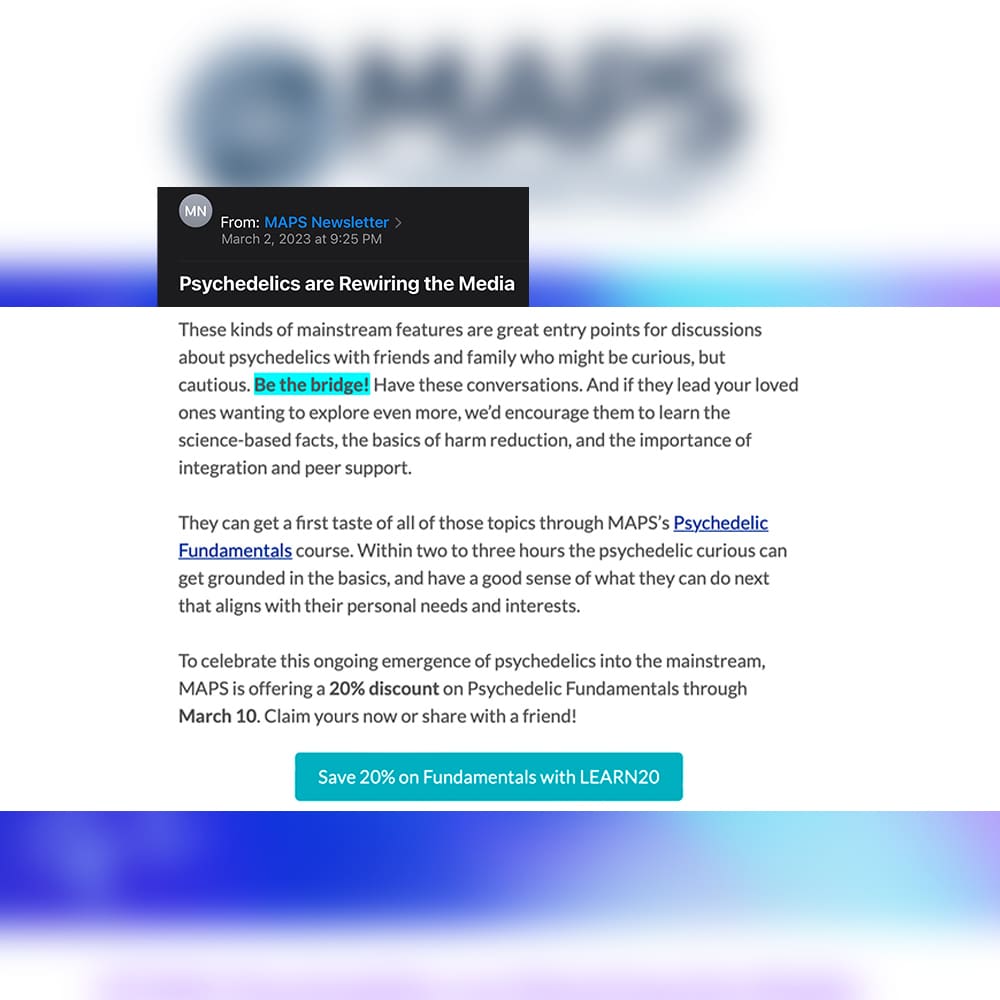
Liana Sananda Gillooly, the Strategic Initiatives Officer at MAPS, posted on Facebook that “John Oliver thoroughly and accurately covering our work last night calls for a rare Facebook post !!!”
After so many years of excellent coverage, Last Week Tonight’s reporting on psychedelic-assisted therapy departed from its usual approach of highlighting important perspectives that have been obscured by industry narratives. The release of this episode puts Last Week Tonight on a long and growing list of media outlets that have added fuel to the hype of psychedelic medicalization. By omitting the potential risks and actual harms associated with psychedelic-assisted therapy, this messaging increases the risk to the public by presenting unrealistic expectations about experimental treatments. While Psymposia opposes prohibition and advocates for full decriminalization of all drugs, we believe that evidence-based media coverage, drug education, and harm reduction require open and honest discussion about drug use across contexts. Without this responsible coverage, real people will continue to be harmed as a consequence of editorial decisions like those made by Last Week Tonight.
Recent Stories
Resources (click to expand)
Cover Story Season 1: Power Trip, and Power Tripping (New York Magazine & Psymposia)
Cover Story: Power Trip is an investigative podcast from New York Magazine. The first season, Power Trip, uncovers the secrets and exposes the darkest corners of the psychedelic renaissance through a twisted, deeply personal tale at the intersection of mind, body, and control.
Power Tripping was Psymposia’s weekly deep-dive into New York Magazine’s Cover Story: Power Trip podcast. These decompression conversations aired after each Cover Story: Power Trip episode, exploring topics in further detail and offering behind-the-scenes information.
You Won’t Feel High After Watching This Video by Hannah Rosin (The Cut)
The Trials of Rick Doblin by Lily Kay Ross and David Nickles (The Cut)
The Mind Field by Elise Worthington, Kyle Taylor, and Tynan King (ABC)
A precautionary Approach to Touch in Psychedelic-Assisted Therapy by By Neşe Devenot, Emma Tumilty, Meaghan Buisson, Sarah McNamee, David Nickles, and Lily Kay Ross (Petrie-Flom’s Bill of Health, Harvard Law School)
Health Canada Investigation of MDMA Clinical Trials Findings — A Response by Emma Tumilty
Footage of therapists spooning and pinning down patient in B.C. trial for MDMA therapy prompts review by Bethany Lindsay (CBC)
Health Canada announces review of all MDMA trials, as complaint alleges major flaws and safety issues by Bethany Lindsay (CBC)
Drug policy group condemns psychedelic research association for response to B.C. sex assault claims by Bethany Lindsay (CBC)
A psychedelic therapist allegedly took millions from a Holocaust survivor, highlighting worries about elders taking hallucinogens by Olivia Goldhill (STAT)
Who’s Researching the Researchers? by Russell Hausfeld
Psychedelic medicine group investigating a board member accused of financial elder abuse by Olivia Goldhill (STAT)
Treating depression with psychedelics: red flags and FAQ by Eiko Fried
The problem at the heart of modern psychedelic clinical research by Rich Haridy (New Atlas)
The Severe Lack of Long-Term Psychedelic Studies by Floris Wolswijk (Blossom Analysis)
Methodological challenges in psychedelic drug trials: Efficacy and safety of psilocybin in treatment-resistant major depression (EPIsoDE) – Rationale and study design by Lea J. Mertens, Michael Koslowski, Felix Betzler, Ricarda Evens, Maria Gilles, Andrea Jungaberle, Henrik Jungaberle, Tomislav Majić, Andreas Ströhle, Max Wolff, Stefan Wellek, Gerhard Gründer
Psychedelic Identity Shift: A Critical Approach to Set And Setting by Neşe Devenot, Aidan Seale-Feldman, Elyse Smith, Tehseen Noorani, Albert Garcia-Romeu, and Matthew W. Johnson
Inside the Dispute Over a High-Profile Psychedelic Study by Shayla Love (Vice)
Undertheorized sources of risk in psychedelic-assisted therapy’s limited research evidence by Mazdak M. Bradberry, Natalie Gukasyan, and Charles L. Raison (JAMA)
Everything you need to know about psychedelics and mental illness by Stuart Ritchie (Science Fictions Substack)
MAPS’ Clinical trial inspection report card summary (Health Canada)
Remedy’s Clinical trial inspection report card summary (Health Canada)
Psymposia’s Corporadelic reporting beat
Dark Side of the Shroom: Erasing Indigenous and Counterculture Wisdoms with Psychedelic Capitalism, and the Open Source Alternative by Neşe Devenot, Trey Conner, and Richard Doyle (Anthropology of Consciousness)
Inside Synthesis Institute’s Implosion by Josh Hardman (Psychedelic Alpha)
The Brave New World of Legalized Psychedelics Is Already Here by Zoe Cormier (The Nation)
Acid liberalism: Silicon Valley’s enlightened technocrats, and the legalization of psychedelics by Maxim Tvorun-Dunn (The International Journal on Drug Policy)
Hey! Before you go… Psymposia is a 501(c)(3) non-profit media organization that offers critical perspectives on drugs, politics, and culture. We strive to ask challenging questions, and we’re committed to independent reporting, critical analysis, and holding those who wield power accountable.
Our perspectives are informed by critical analysis of the systemic crises of capitalism that have directly contributed to the unmitigated growth of addiction, depression, suicide, and the unraveling of our social relations. The same economic elite and powerful corporate interests who have profited from causing these problems are now proposing “solutions”—solutions which both line their pockets and mask the necessity of structural change.
In order for us to keep unpacking these issues and informing our audience, we need your continuing support. You can sustain Psymposia by becoming a supporter for as little as $2 a month.






